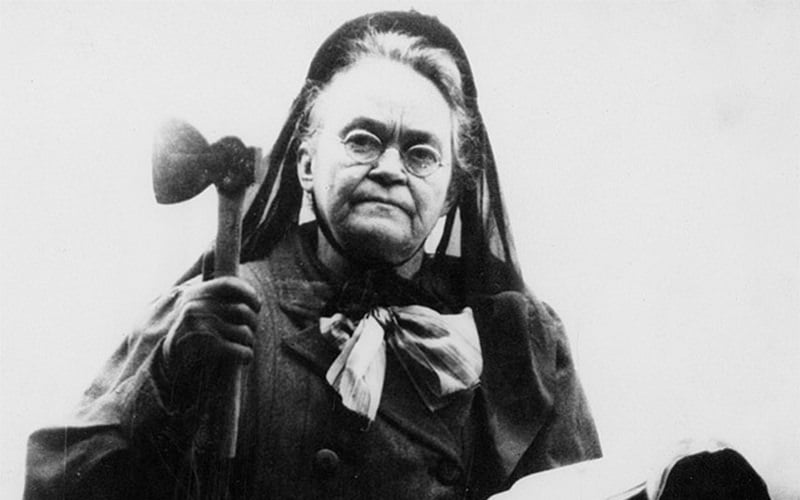Carry A. Nation took a direct approach to further the prohibition movement’s goals, often far too direct for the tastes of authorities. Her unusual life story was not only engaging in and of itself but also highlighted some of the motivations women had for joining the movement that eventually led to Prohibition. But did you know how she started her advocacy?
Carrie Nation, a woman who used a hatchet to attack saloons to protest widespread alcohol consumption in the United States before prohibition.
The Story Behind her Battle with Alcohol
According to the State Historical Society of Missouri, Nation came from Kentucky, where she grew up in a slaveholding family with a large farm. After the Civil War, her family relocated to Missouri, where she married Charles Gloyd when she was 21. He was a young doctor who had served in the Union Army but also an alcoholic who couldn’t keep a job or support her financially. Nation returned to her parents after becoming pregnant. Charlie, her daughter, named after Gloyd, was born in September, and Gloyd died only a few months later. Despite rebuilding her life, becoming a teacher, and eventually remarrying a lawyer named David Nation, Nation was influenced by her first dysfunctional marriage. (Source: The Smithsonian Magazine)
Carrie Nation’s Approach Against Alcohol
Nation began to have visions as she grew older and became more religious. According to the historical society, her husband also became a preacher. They relocated to Kansas, where Nation founded a Women’s Christian Temperance Union branch.
The union, founded in 1874, sought to prohibit alcohol because of the harm it caused to families, particularly women and children whose male relatives drank excessively. An alcoholic and possibly violent spouse was a big deal when women lacked legal rights and recourse and had to rely on male breadwinners for some or all of the family income. However, the anti-alcohol crusade soon expanded to include other perceived social impurity sources, such as smoking and sexual promiscuity. The union proposed to cure these vices by granting women the right to vote and enlisting middle-class white women’s social services.
Nation’s approach to the prohibition crusade was more direct than that of many women around her. On this day in 1900, she smashed the bar at the Carey Hotel in Wichita, Kansas, with a hatchet. She was arrested, but Nation, who was released shortly after the incident, became famous for carrying a hatchet and wrecking saloons. (Source: The Smithsonian Magazine)
Carrie Nation’s Brand
Carry Nation understood the value of her brand; she trademarked her unusual name, which is also spelled Carrie in some accounts in Kansas, according to Virginia Commonwealth University. Nation, standing nearly six feet tall, used her commanding presence to promote her cause and brand. She also left Kansas, where the sale of alcohol was technically illegal, and took her vision and hatchet with her.
Her behavior provoked a tremendous uproar and sent her to jail repeatedly for disorderly conduct and disturbing the peace. Later, fines were paid by the sale of pewter hatchet pins. Nation wielded her voice as effectively as her hatchet, eloquently speaking her mind and inspiring others on numerous occasions. Even sworn enemies acknowledged her success with compelling enforcement of prohibition laws and spreading her message.
Virginia Commonwealth University
Nation and her husband divorced in 1901, and she spent the rest of her life on speaking tours. Her efforts enabled her to purchase a small farm in Arkansas, which she planned to turn into a prohibition school to educate other activists. She died in January 1911, nearly a decade before the Eighteenth Amendment was ratified. (Source: The Smithsonian Magazine)
Image from Vinepair
